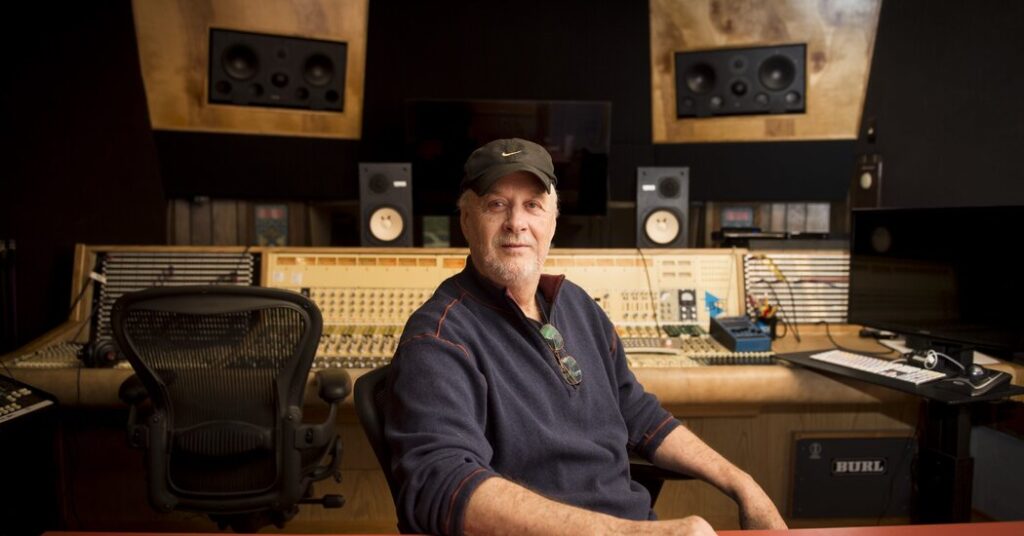David Briggs, a keyboardist and studio operator who played a pivotal role in establishing Muscle Shoals, Ala., as a recording hub in the 1960s before helping to revitalize mainstream country music, died on Tuesday in Nashville. He was 82.
His brother, John, said his death, in a hospice facility, was caused by complications of renal cancer.
Mr. Briggs contributed to not just one but two major developments in popular music. As a member of the original rhythm section at Fame Recording Studios, he helped put the northern Alabama hamlet of Muscle Shoals on the musical map. He played on landmark R&B recordings like Arthur Alexander’s “You Better Move On” (1962), Jimmy Hughes’s “Steal Away” (1964) and the Tams’ “What Kind of Fool (Do You Think I Am)” (1963), all of which were Top 40 pop singles as well as R&B hits.
The rhythm section at Fame, whose members also included Norbert Putnam on bass and Jerry Carrigan on drums, honed a down-home sound that, with its languid blend of country and soul, stood apart from the R&B coming out of Motown or Stax at the time. “You Better Move On” attracted the attention of the Rolling Stones, who released their version of the song in 1964. (The Beatles had previously performed Mr. Alexander’s “Soldier of Love” on the BBC.)
Mr. Briggs’s other defining moment came when he, Mr. Putnam and Mr. Carrigan moved to Nashville in late 1964 and began infusing country recordings with the understated, groove-rich variant of the Nashville Sound that became known as “countrypolitan.”
“We brought along a more blues and pop-rock thing than what Nashville was doing at the time,” Mr. Putnam said in an interview.
He recalled that the singer Ray Stevens, then a top arranger who worked in both Muscle Shoals and Nashville, once said, “You guys play the modern music better than the A-Team we have in Nashville.”
After just a few months in Nashville, Mr. Briggs had distinguished himself as one of the city’s first-call studio keyboard players. He would go on to take part in hundreds of sessions a year into the 1980s.
(An entirely different rhythm section, known as the Swampers, would take up the slack in Muscle Shoals, working with luminaries like Bob Dylan, Aretha Franklin and Wilson Pickett.)
David Paul Briggs was born on March 16, 1943, in Killen, Ala., northeast of Muscle Shoals. He was the elder of two sons of James and Myrtle (Myrick) Briggs. His father was a letter carrier.
Classically trained, David began playing professionally as an adolescent. He worked in a local band called the Crunk Brothers and, through them, met Mr. Putnam and ultimately gained entree to session work at Fame. Mr. Briggs and Mr. Putnam played on Tommy Roe’s chart-topping 1962 hit, “Sheila,” and were members of his backing band when Mr. Roe was an opening act for the Beatles in their first U.S. concert, in 1964.
Mr. Briggs, meanwhile, had begun writing songs and releasing the occasional record of his own as both a singer and keyboardist. One was a single produced by Owen Bradley, who urged him to move to Nashville in 1964 to do studio work.
In 1966, Mr. Briggs joined Elvis Presley’s TCB Band, a job he would keep, along with his session work, until Presley’s death in 1977.
In 1969, Mr. Briggs and Mr. Putnam opened Quadraphonic Sound, a much-in-demand studio that hosted projects by Neil Young, Dan Fogelberg, Jimmy Buffett and the Jacksons. That year, Mr. Briggs joined Area Code 615, a supergroup of session musicians, including Mr. Putnam and the guitarist Mac Gayden, who died this month. The band released a pair of albums of freewheeling country rock on Polydor Records.
Mr. Briggs and Mr. Putnam also founded their own publishing company, Danor Music, which had success with No. 1 pop hits like Steve Winwood’s “Higher Love” and Whitney Houston’s “Didn’t We Almost Have It All.”
The two men sold Quadraphonic Sound in 1979, but Mr. Briggs opened another studio, House of David, three years later. The Blasters, Norah Jones, Bootsy Collins and the indie-rock band Yo La Tengo were among House of David’s numerous clients, along with B.B. King, for whom Mr. Briggs wrote arrangements.
In the 1970s and ’80s, Mr. Briggs began writing and arranging (and sometimes singing) jingles for Coca-Cola, Kentucky Fried Chicken and other products. In 1988, he became the music director for the Country Music Association’s annual television awards show, a position he held until 2001.
Along with Mr. Putnam, Mr. Carrigan and the guitarist Terry Thompson, Mr. Briggs was inducted into the Musicians Hall of Fame in Nashville in 2019. He remained active as a musician and studio owner well into his 70s.
In addition to his brother, he is survived by two sons, Darren and Gabriel, and a grandson. His marriage to Judy McLemore ended in divorce.
Recalling the opening of Quadraphonic Sound in an interview for the National Association of Music Merchants’ Oral History Program, Mr. Briggs said of his partnership with Mr. Putnam, “We wanted a studio that was a little better than everywhere else we’d recorded.”
He added: “When we started, it was going to be a little demo studio, but then we started buying more expensive stuff. It just slowly, slowly grew and became this hot place.”


